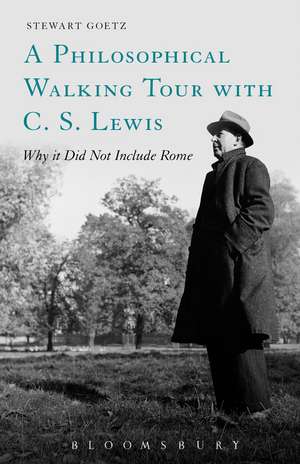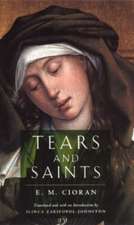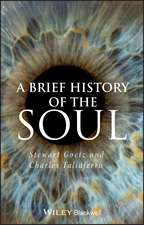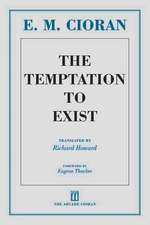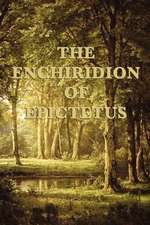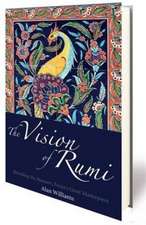A Philosophical Walking Tour with C. S. Lewis: Why it Did Not Include Rome
Autor Professor Stewart Goetzen Limba Engleză Paperback – 11 feb 2015
| Toate formatele și edițiile | Preț | Express |
|---|---|---|
| Paperback (1) | 190.06 lei 6-8 săpt. | |
| Bloomsbury Publishing – 11 feb 2015 | 190.06 lei 6-8 săpt. | |
| Hardback (1) | 830.62 lei 6-8 săpt. | |
| Bloomsbury Publishing – 11 feb 2015 | 830.62 lei 6-8 săpt. |
Preț: 190.06 lei
Preț vechi: 221.76 lei
-14% Nou
Puncte Express: 285
Preț estimativ în valută:
36.37€ • 38.10$ • 30.14£
36.37€ • 38.10$ • 30.14£
Carte tipărită la comandă
Livrare economică 08-22 aprilie
Preluare comenzi: 021 569.72.76
Specificații
ISBN-13: 9781628923179
ISBN-10: 1628923172
Pagini: 200
Dimensiuni: 140 x 216 x 18 mm
Greutate: 0.27 kg
Editura: Bloomsbury Publishing
Colecția Bloomsbury Academic
Locul publicării:New York, United States
ISBN-10: 1628923172
Pagini: 200
Dimensiuni: 140 x 216 x 18 mm
Greutate: 0.27 kg
Editura: Bloomsbury Publishing
Colecția Bloomsbury Academic
Locul publicării:New York, United States
Caracteristici
Makes clear how the thought of a popular writer like Lewis was rooted in deep philosophical reflection
Notă biografică
Stewart Goetz is Professor of Philosophy and Ross Frederick Wicks Distinguished Professor of Philosophy and Religion at Ursinus College, USA. His past publications include The Purpose of Life: A Theistic Perspective (2012), The Soul Hypothesis: Investigations into the Existence of the Soul (co-edited with Mark C. Baker, 2010), and A Brief History of the Soul (co-authored with Charles Taliaferro, 2011).
Cuprins
Introduction1: C. S. Lewis, Mere Christianity, and Roman Catholicism2: C. S. Lewis on Happiness, Pleasure, and Pain3: C. S. Lewis on Soul and Body4: Thomas Aquinas on Happiness, Pleasure, and Pain5: Thomas Aquinas on Soul and Body6: C. S. Lewis in Defense of Common SenseBibliographyIndex
Recenzii
A book all interested in C. S. Lewis will want to read.
This [is a] philosophical page-turner ... One of the most unique and eclectic books on Lewis in recent years, it easily shoots to the top rank of studies on Lewis's philosophical and theological thought ... Highly recommendable for serious philosophers and students in 'Lewisiology'.
Goetz makes a strong case that Lewis is a hedonist concerning happiness and that he is a substance dualist with regard to mind and body . this book fills a major gap in the literature on Lewis's philosophical ideas. Summing Up: Recommended. Lower-level undergraduates through researchers/faculty.
Why didn't C. S. Lewis's religious journey end in Rome? Stewart Goetz suggests that the answer involves a theoretical quarrel with Thomas Aquinas about pleasure and the soul. It is a provocative thesis, carefully argued.
This book is doubly intriguing, both as a fresh and illuminating piece of Lewis scholarship, and as an exploration of philosophical issues that are deeply interesting in their own right, such as the relationship between pleasure and true happiness. Goetz makes a convincing case that Lewis retained his Protestant identity not only for reasons typically cited, but also because of fundamental differences with Rome that were philosophical in nature. Anyone interested in these issues will find this volume fascinating as well as informative.
An informative argument to the effect that Lewis's views of happiness (Hedonism) and the self (Substance Dualism) were the primary intellectual barriers to him becoming a Roman Catholic--anyone with an interest in Lewis as a philosopher/theologian will find much here that is both pleasurable and good for the soul.
This is the most intellectually satisfying book on C. S. Lewis I have read. Because of Goetz's meticulous and respectful attention to Lewis's thought, as required for accurate treatment of his philosophical opinions, all that he says consequently about his subject bears the mark of this fair and careful reasoning. He is convincing on Lewis's differences with the received Catholic philosophy of his time; nothing in it is careless, facile, or partisan, and he blesses in particular Catholic readers who love Lewis with his conviction that inability to join the Catholic Church was based primarily on honorable difficulties with Thomism . [A] must-read book.
This [is a] philosophical page-turner ... One of the most unique and eclectic books on Lewis in recent years, it easily shoots to the top rank of studies on Lewis's philosophical and theological thought ... Highly recommendable for serious philosophers and students in 'Lewisiology'.
Goetz makes a strong case that Lewis is a hedonist concerning happiness and that he is a substance dualist with regard to mind and body . this book fills a major gap in the literature on Lewis's philosophical ideas. Summing Up: Recommended. Lower-level undergraduates through researchers/faculty.
Why didn't C. S. Lewis's religious journey end in Rome? Stewart Goetz suggests that the answer involves a theoretical quarrel with Thomas Aquinas about pleasure and the soul. It is a provocative thesis, carefully argued.
This book is doubly intriguing, both as a fresh and illuminating piece of Lewis scholarship, and as an exploration of philosophical issues that are deeply interesting in their own right, such as the relationship between pleasure and true happiness. Goetz makes a convincing case that Lewis retained his Protestant identity not only for reasons typically cited, but also because of fundamental differences with Rome that were philosophical in nature. Anyone interested in these issues will find this volume fascinating as well as informative.
An informative argument to the effect that Lewis's views of happiness (Hedonism) and the self (Substance Dualism) were the primary intellectual barriers to him becoming a Roman Catholic--anyone with an interest in Lewis as a philosopher/theologian will find much here that is both pleasurable and good for the soul.
This is the most intellectually satisfying book on C. S. Lewis I have read. Because of Goetz's meticulous and respectful attention to Lewis's thought, as required for accurate treatment of his philosophical opinions, all that he says consequently about his subject bears the mark of this fair and careful reasoning. He is convincing on Lewis's differences with the received Catholic philosophy of his time; nothing in it is careless, facile, or partisan, and he blesses in particular Catholic readers who love Lewis with his conviction that inability to join the Catholic Church was based primarily on honorable difficulties with Thomism . [A] must-read book.
